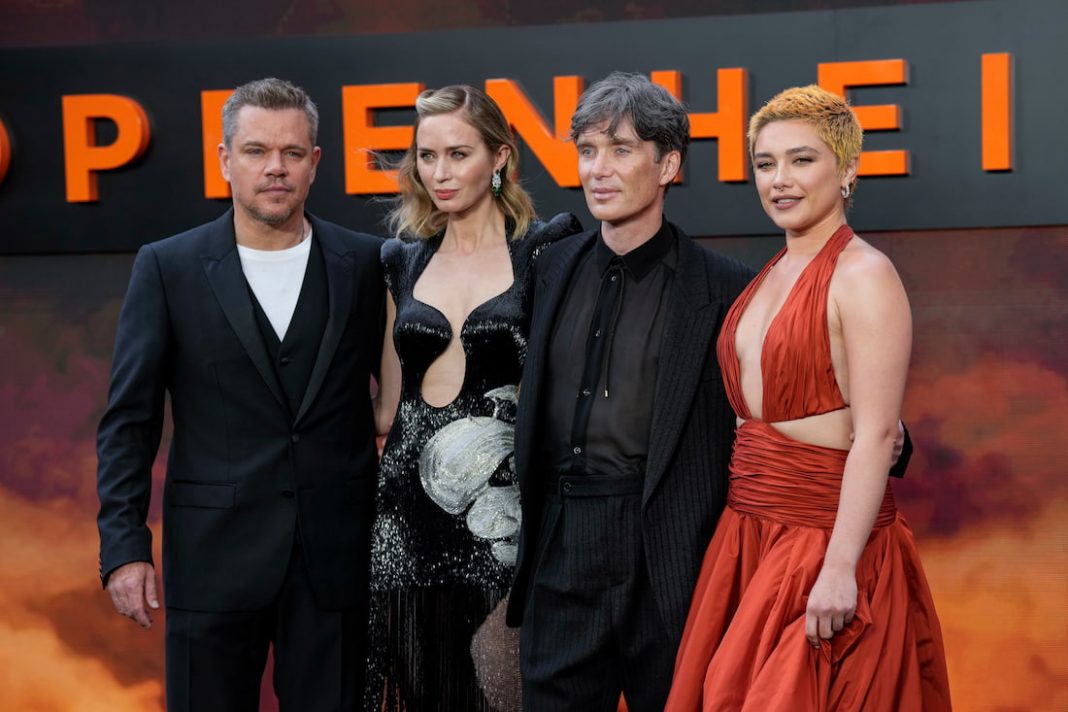Stars of the film Oppenheimer including Matt Damon and Emily Blunt have walked out of the premiere in solidarity with the Hollywood actors union strike.
Director Christopher Nolan confirmed their departure before the beginning of the London premiere screening on Thursday night.
The cast, which includes Cillian Murphy as the mastermind behind the Manhattan Project, as well as Matt Damon, Emily Blunt and Florence Pugh, had a plan to leave if a strike was called amid the fanfare.
“We talked about it,” Damon told entertainment magazine Variety shortly before the union declared a strike.
“Look, if it’s called now, everyone’s going to walk obviously in solidarity. Once the strike is officially called, (we’re walking). That’s why we moved this (red carpet) up because we know the second it’s called, we’re going home.”
The premiere was brought forward by an hour ahead of a Los Angeles press conference by the union, the Screen Actors Guild-American Federation of Television and Radio Artists (SAG-AFTRA).
Damon’s co-star Kenneth Branagh said it was important to show support for fellow actors.
“There are a lot of people here we did not want to disappoint, but we’re also in complete solidarity with our colleagues and what they’re doing,” he said.
“I know they’ve worked diligently to achieve an agreement which is happening at a critical point in our industry. It’s important that we’re ready to be shoulder-to-shoulder with them as the situation develops.”
Damon and Branagh were joined at the premiere by co-stars Josh Hartnett, Tom Conti, Robert Downey Jr and Rami Malek.
The cast and crew posed for photos alongside director Nolan and producer Emma Thomas minutes before the strike was called.
SAG-AFTRA’s national board of directors on Thursday voted unanimously to approve a strike action for the 160,000 actors comprising the union’s membership.
The move widened the scope of labour unrest in an entertainment industry that is already facing numerous headwinds and an ongoing strike among its writers.
The vote came after negotiations between the actors’ union and the major studios – represented in labour dealings by the Alliance of Motion Picture and Television Producers – failed to reach an agreement on a new film and TV contract.
The old collective bargaining agreement expired Wednesday night without a deal in place.
Much like screenwriters who halted work on May 2 and have been picketing since, actors have been battling studios for a deal that would deliver far better pay and residuals from streaming.
That deal would also address other issues, such as the use of artificial intelligence, that have been reshaping the entertainment landscape.
The dual strikes – the likes of which Hollywood hasn’t seen since 1960 – is shaping up to be an extraordinary stand-off that historians and labour experts have attributed to a confluence of cohesion among Hollywood unions, a nationwide rise in labour activism after the COVID-19 pandemic and dramatic technological change.
“It’s really about working actors,” Damon told Variety.
“It’s $US26,000 ($A38,000) to qualify for health coverage and a lot of people are on the margins and residual payments are getting them across that threshold.
“This isn’t an academic exercise. This is real life-and-death stuff. Hopefully, we get to a resolution quickly. No one wants a work stoppage, but we’ve got to get a fair deal.”



